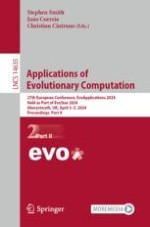2024 | OriginalPaper | Chapter
Using Evolution and Deep Learning to Generate Diverse Intelligent Agents
Authors : Marshall Joseph, Brian J. Ross
Published in: Applications of Evolutionary Computation
Publisher: Springer Nature Switzerland
Activate our intelligent search to find suitable subject content or patents.
Select sections of text to find matching patents with Artificial Intelligence. powered by
Select sections of text to find additional relevant content using AI-assisted search. powered by
